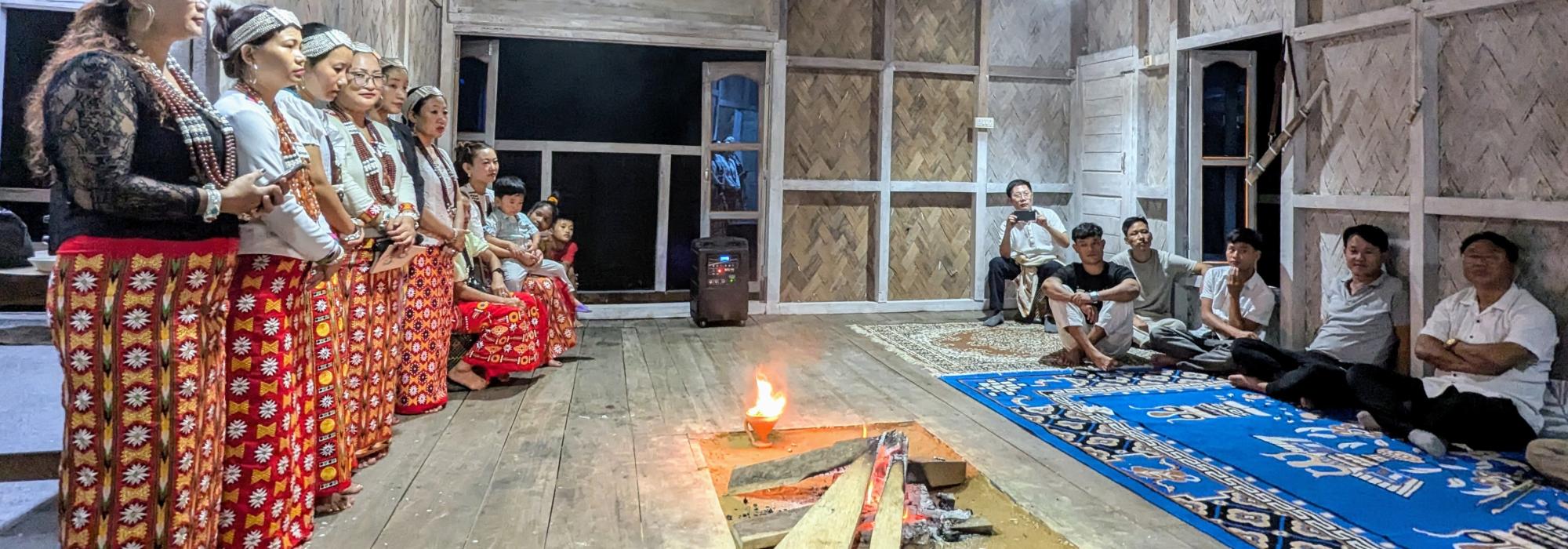
Supporting Integral Ecology Transformation in North East India
Key Details
The LSRI is currently engaged in research on the issue of language endangerment. We see this as indexing to wider trends of globalisation, environmental pressures and cultural homogenisation. It also links to ecology, as a loss of indigenous languages results equates to a loss of understanding of local flora and fauna and their role they play in the social and cultural life of a community. We are working in particular with partner organisation the North Eastern Institute of Language and Culture, a centre for research, documentation and revitalisation of endangered languages of North East India. You can find out more about this work here.
This month our colleague Dr Peter Rožič SJ travelled to North East India. He was there to support a scholarly conference on the topic of language, ecology and culture. The event was designed to support indigenous scholarly contributions in particular.
In his own words, Peter describes his trip and offers a valuable insight into why this particular work is so important:

I’m deeply grateful for the opportunity to have travelled through India, immersing myself in the rich tapestry of its indigenous cultures, languages, and landscapes. From the bustling streets of Delhi to the serene landscapes of Assam and Arunachal Pradesh, every moment was an enlightening and inspiring learning experience.
I offer special thanks to Dr Vijay D'Souza and the dedicated team at NEILAC for their unwavering commitment to preserving indigenous languages and cultures. Working with them has been nothing short of remarkable. Vijay’s passion and leadership in bridging the gap between language, culture and ecology have been central to this tour. His work with indigenous tribes — particularly his efforts to transcribe and preserve their alphabets, knowledge and customs — exemplifies how cultural preservation goes hand-in-hand with environmental sustainability. The dedication of the NEILAC team is unmatched, and their work is a testament to what grassroots and research efforts can accomplish.
I had the privilege of witnessing collaborations with tribal communities first-hand. These communities, deeply connected to nature, embody the integral ecology paradigm, as envisioned in the Laudato Si' encyclical. The traditional dances, blessings and everyday practices of these tribes reflect a sustainable way of living that many of us can learn from.
I offer special thanks to Dr Vijay D'Souza and the dedicated team at NEILAC for their unwavering commitment to preserving indigenous languages and cultures. Working with them has been nothing short of remarkable. Vijay’s passion and leadership in bridging the gap between language, culture and ecology have been central to this tour. His work with indigenous tribes — particularly his efforts to transcribe and preserve their alphabets, knowledge and customs — exemplifies how cultural preservation goes hand-in-hand with environmental sustainability. The dedication of the NEILAC team is unmatched, and their work is a testament to what grassroots and research efforts can accomplish.
I had the privilege of witnessing collaborations with tribal communities first-hand. These communities, deeply connected to nature, embody the integral ecology paradigm, as envisioned in the Laudato Si' encyclical. The traditional dances, blessings and everyday practices of these tribes reflect a sustainable way of living that many of us can learn from.
Peter continues with a description of key highlights of his trip, including:
- Collaborating with Indigenous Communities:
One of the most profound experiences was my time with the tribal people in Arunachal Pradesh. NEILAC’s work is a crucial step in preserving their culture and ensuring the survival of languages that are at risk of disappearing. - Transdisciplinary Conversations:
Participating in the International Conference on Language, Ecology, and Culture (ICLEC) in Guwahati was an intellectually enriching experience. The conversations around biocultural diversity, indigenous knowledge and the intersection of language and ecology were illuminating. Scholars and practitioners brought unique perspectives on how we can tackle global challenges, using the wisdom of indigenous communities. - The Beauty and Resilience of Nature:
Walking through the landscapes of Assam and Arunachal Pradesh, I was struck by the interconnectedness of the natural world and the indigenous cultures that thrive within it. Whether it was engaging in traditional dances or witnessing the biodiversity in these regions, every moment emphasised how essential it is to protect both nature and culture. The loss of one inevitably leads to the loss of the other. - Education and Social Justice:
Visiting the Jesuit schools in Arunachal Pradesh was another powerful experience. The dedication of the Jesuits to providing quality education, particularly to marginalised communities, is an incredible example of faith in action. Their work directly ties into integral ecology, as education empowers communities to sustainably engage with their environment while preserving their cultural heritage. - Jesuit Leadership and Integral Ecology:
Time spent with the Jesuit Refugee Service (JRS) in Delhi was both humbling and insightful. Engaging with leaders like Stephen Raj SJ and Vincent Ekka SJ on climate-induced displacement reaffirmed the importance of connecting social justice with environmental advocacy. The role of the Jesuits in India is vital, as they work tirelessly to support communities facing some of the harshest realities due to climate change. - Teaching and Inspiring the Next Generation of Jesuits:
One of the most uplifting moments of my journey was lecturing at Vidyajyoti College of Theology in New Delhi. I had the privilege of engaging with young Jesuits on topics of Environmental Justice, Jesuit Leadership, and Integral Ecology. Their passion, curiosity, and deep commitment to these missions were truly inspiring, and I left feeling hopeful for the future of our work.
I am humbled by this experience, knowing there is so much more to learn from these communities and collaborators. And there is much work to be done, but I am hopeful and energised by the deep connections and learnings from this journey.


